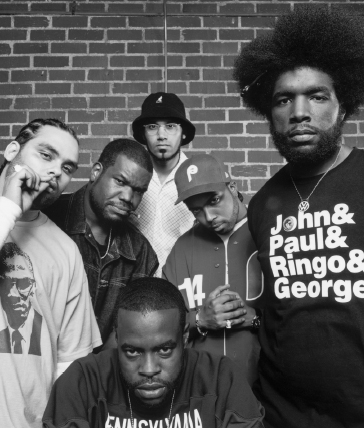

Back in the late ’70s and early ’80s, many saw rap music as the next disco, an empty fad that would undoubtedly burn out after a few years of immense popularity. Nowadays, with rap albums consistently topping the charts and rappers making serious dollars, the art form has soundly beaten that label. Still, in some very subtle ways, that post-disco backlash lives on, and can be seen in the general reaction to The Roots throughout most of the group’s career.
Since the Philadelphia rap group hit the scene in the early ’90s with its debut album Organix, the word on the street has been “Wow, these guys actually play their own instruments,” which is just another way of saying “Holy shit! A rap group that’s actually talented!” Rolling Stone called the band’s excellent 1996 album Illadelph Halflife “a breath of fresh air,” even though the record came out amongst one of the more fruitful periods in the history of rap music. (That year alone saw the release of Busta Rhymes’ solo debut, A Tribe Called Quest’s masterpiece Beats, Rhymes & Life, Outkast’s ATLiens and Kool Keith’s Dr. Octagon album, to name a few.)
Now don’t get me wrong, The Roots are one of the most brilliant collectives in hip-hop today—one that certainly deserves the showers of critical acclaim that it has received. However, the unsaid warning that lies behind many of the reactions I’ve read and witnessed has been less than inspiring for rap music as a whole. Namely, it’s that rap isn’t “real music,” that “anybody could do it,” that it’s just something that rebellious teenagers like because it pisses off their parents. To me, it seemed like people were saying that The Roots were worthwhile because they weren’t hip-hop. It was almost like they were being treated as a novelty act; they were “a breath of fresh air” only because they play their own instruments, and play them well.
The reality is, The Roots embody the beauty of hip-hop as much as any rap group in history, and it’s not just because they know their scales. Each of their five albums exhibits a burning desire to explore the furthest reaches of the music while never straying from its raw materials: intense poetry and organic musical energy. If you manage to catch the group’s performance on April 24 at Buffalo State, you’ll be privileged to watch one of the tightest ensembles in all of music, capturing the fascinating urgency of hip-hop via a kinetic mix of jazz, funk and rock n’ roll. Centered around the unstoppable nucleus of MC Black Thought and drummer ?uestlove, The Roots have it all, from soulful explorations of personal politics to grooves that simply make you lose your head. There’s really nothing in music that’s quite like the taut snap of ?uestlove’s snare drum, and Thought’s rhymes are introspective, colorful and thought-provoking.
On the group’s latest album, 2002’s Phrenology, the band continues to live up to its reputation for pushing its own boundaries, leaving the more relaxed, Fender Rhodes-focused funk of prior releases behind and favoring a more raucous, distorted sound, epitomized by the chunky power chords of “Rock You,” the album’s opener. ?uestlove’s thunderous, almost John Bonham-esque beat is a statement in itself, anchoring the gripping, aggressive track with the message that The Roots will never be content to stick with a formula, and that they’ll be consistently and defiantly unpredictable. When delving deeper into Phrenology, its artistic zealousness is revealed; this is more than just The Roots doing rock. “The Seed 2.0” is a sizzling soul cut, with a powerful guest spot from underground soul savant Cody ChesnuTT. “Water” is an ambitious meld of stark storytelling and jazz-fusion, and “Rolling With Heat” is a good, old-fashioned, pulse-pounding hip-hop cut, featuring the electric skills of guest MC Talib Kweli. The album is much more than a breath of fresh air; it’s a brave artistic statement that’s boldly attempting to give hip-hop music some direction and focus.
There’s no doubt that The Roots are part of the vanguard of rap groups that will lead the form through this decade, in the same way that A Tribe Called Quest, De La Soul and Public Enemy paved the way for them in the early ’90s. On April 24, don’t let the stage set-up fool you, because the spirit of The Roots is identical to the spirit that moved Q-Tip, Phife Dawg and Ali Shaheed Muhammad to make brilliant, inspired music with nothing but turntables, samplers and microphones. Their goal is to invoke the same reaction that Grandmaster Flash did with old drum machines and kazoos. To really get to the heart of what The Roots are all about, look past the instruments and the novelty, and revel in the beautiful way they communicate their happiness, anger, strife and joy by combining beats with rhymes.
Appeared in the April 17, 2003, issue of Artvoice.